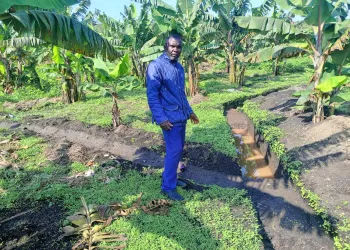
 Jubilee Radio
Jubilee Radio

 Jubilee Radio
Jubilee Radio
14 October 2025, 18:24

By Claire Nayebare
In Harugongo, Kabarole district, farmers led by Francis Asaba are pioneering organic farming to feed Fort Portal sustainably. Through their cooperative, Mugamba Turoorre Hara SACCO, they use natural fertilisers, traditional pest control, and soil conservation methods to protect the environment and promote healthy, chemical-free food production.
In the hills of Harugongo, a rural subcounty in Kabarole district and part of the greater Tooro subregion, a quiet but determined shift in farming practices is taking root as farmers increasingly turn to agroecological methods to maintain soil fertility, improve food security, and protect the environment.
Harugongo, often referred to as the “food basket” of Fort Portal City, is home to hundreds of small-scale farmers with not only fertile soils, but also a strong communal spirit. The farmers have equally embraced organic agriculture to produce food that is not only healthy but also environmentally sustainable.
A farmer visited by Jubilee Radio, Francis Asaba alias Pastor, hails from Kantemeho Harugongo and doubles as the chairperson of Mugamba Turoorre Hara Farmers SACCO, a cooperative that now brings together about 100 members. Asaba, who rents and manages over 40 hectares of Banana plantation, has adopted agroecology as a practical and ethical approach to farming.
“We use goat dung from our own farms and sometimes buy from neighbors. It’s natural and it works,” he said during a visit to his farm. “We don’t use pesticides. Instead, we collect human urine from the nearby school, dilute and spray it on the bananas. It helps in controlling diseases and boosting plant health.” He explained.
Intercropping
His plantation is also intercropped with beans, grown by other farmers who, in turn, provide labor to maintain the banana fields. Asaba has also constructed trenches across the hilly plantation to help prevent soil erosion and harvest rainwater for use during dry seasons.
He was however quick to add that not many members have embraced the trench method.
According to Asaba, 97% of the farming practices on his land are organic. He believes such methods are key to reducing food-related health issues while safeguarding the environment for future generations.
“The yields may be lower than those from inorganic farming, but we are producing clean, safe food and protecting our land,” Said Asaba
Storing Harvest
Another farmer and member of the SACCO, Elizabeth Mbabazi, who serves as the group’s harvest storekeeper, narrated that with over 20 years of farming experience, she continues to rely on organic inputs such as cow dung, goat manure, and rabbit urine to grow beans, groundnuts, and onions.
“We don’t buy fertilisers,” she said. “They’re expensive and damage the soil in the long run. We use what we have, and it has been working”.
To keep stored grains free from pests, Elizabeth revealed that she uses traditional herbs. According to the past seasons, Harugongo farmers often faced a challenge of seed selection, with many agricultural products on sale. She noted that they have resorted to seed saving to maintain genuine or adaptable to their conditions.
The SACCO’s goal, according to its members, is to shift smallholder farming from mere subsistence—what they call “garden to mouth” to a more commercial model of “garden to sale and consumption.” Through shared knowledge, cooperative savings, and sustainable practices, they hope to improve livelihoods without compromising health or nature.
While agroecology presents challenges, including relatively lower yields, the farmers in Harugongo see it as a necessary trade-off.
“We must have mercy on the environment and on those we feed,” Asaba emphasised. “That’s why we farm this way.”
Nutritionists speak out
Dr. Bernard Bwambale, earlier raised serious concerns about the misuse of synthetic chemicals in Ugandan agriculture. He points out that many active ingredients and brands of pesticides registered in Uganda qualify as highly hazardous pesticides under international criteria, and some are banned in their countries of origin. He warns that produce laced with toxic residues is entering the food chain, posing risks of cancer, reproductive harm, and other long-term health effects.
He also emphasises the need for stricter regulation, proper training of farmers, and safer, agroecological alternatives to protect both human health and environmental sustainability.
Esaff Uganda
According to ESAFF, a network of grassroots small scale farmers’ organisations working in 16 countries of Eastern and Southern Africa (ESA) region, Agriculture has multiple connections to critical aspects, such as food security, livelihoods, especially for the rural poor, ecosystems, climate change, and health, making it a crucial sector for achieving the Sustainable Development Goals (SDGs). By 2050, the earth will need to feed close to 10 billion people.
Farmers must therefore transform their agricultural and food systems, so they work with and not against nature. They suggest that agroecology, which can drastically reduce hunger and malnutrition, is the only approach that brings small-scale farmers closer to solving the current food sovereignty challenges in Uganda mainly because it allows efficient resource use, reduces harmful external inputs, and improves soil health.